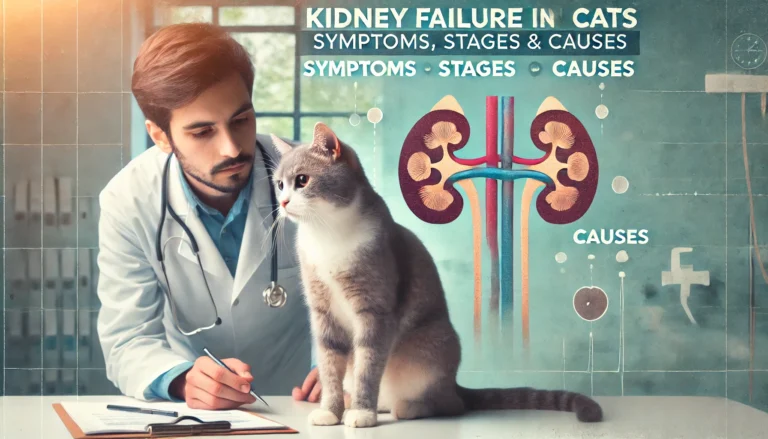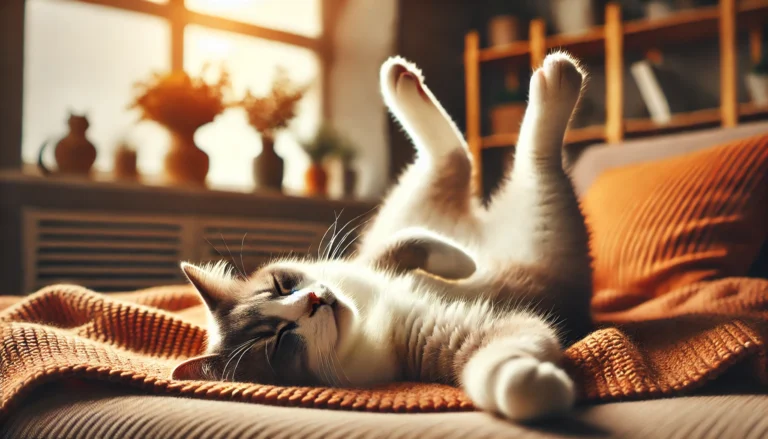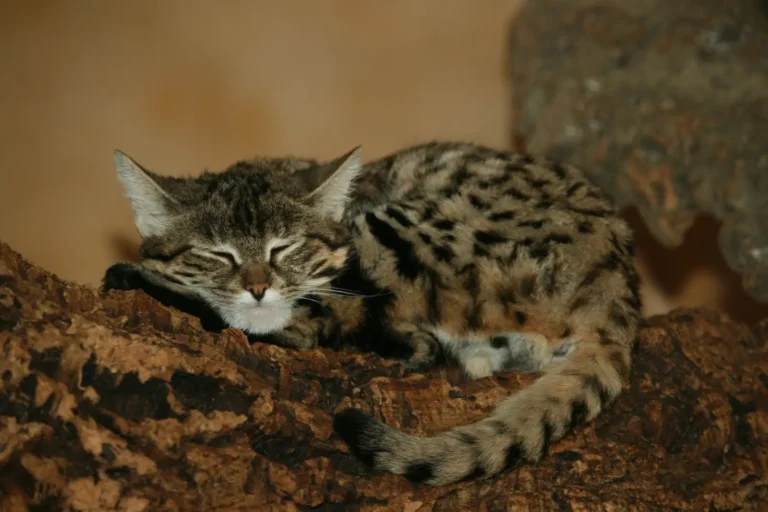Anal Glands in Cats: Essential Care Tips for a Healthy Cat

Caring for our feline friends involves understanding some lesser-known parts of their anatomy, like their anal glands. If you’ve noticed your cat scooting, licking excessively, or leaving an unusual smell, they might have an issue with their anal glands. Knowing the signs, symptoms, and how to take care of these glands can help keep your cat comfortable and healthy.
What Are Anal Glands in Cats?
Anal glands in cats are two small sacs located on either side of the anus, at around the 4 and 8 o’clock positions. These glands produce a strong-smelling fluid used for scent marking. Every time a cat defecates, a small amount of this fluid is usually released, leaving a unique scent that helps mark their territory.
In the wild, these scent glands were more essential for communication and establishing territory. Even though our domestic cats don’t rely on these glands as much, they still serve specific biological functions.
Functions of Cat Anal Glands
The feline anal glands serve several roles that may surprise you:
- Scent Marking and Communication
When cats use their litter box, a small amount of glandular fluid is released, leaving a scent mark. This behavior is instinctive and essential for communicating with other animals. - Identification and Social Signals
Each cat has a unique scent, and they use it to recognize each other. Just like a fingerprint, this scent can communicate information about health, identity, and social hierarchy. - Helping with Digestion
Although anal glands in cats don’t directly aid digestion, the natural expression of these glands during bowel movements helps keep them healthy. - Health and Mating Signals
In some cases, the scent from the anal glands can indicate the cat’s health or reproductive status, though this is more relevant in the wild.
Common Problems Anal Glands in Cats
Just like dogs, Anal Glands in Cats can sometimes develop issues, which may cause discomfort or even pain. Here are the most common problems you might encounter with your cat’s anal glands:
- Impacted Anal Glands
When a cat’s glands don’t empty properly, they can become impacted, causing discomfort. Impacted glands may lead to cat scooting (dragging their bum on the floor) or licking the area. - Infection in Cat Anal Glands
Impaction can sometimes lead to infections. You may notice swelling or a fishy smell from the anus. Left untreated, the infection can form an abscess. - Anal Gland Abscess or Rupture
If an infection progresses, an abscess may form and, in severe cases, rupture. This is particularly painful and requires immediate attention. - Tumors or Growths
Rarely, tumors can develop in a cat’s anal glands. This condition is uncommon but requires immediate veterinary care. - Leaking Anal Glands
Occasionally, a clear liquid where a cat is laying may indicate leaking glands. This leakage may leave behind a fishy odor or stain on furniture.
Signs Your Cat Has Anal Gland Issues
Recognizing the signs of anal gland problems in cats is essential to take action. Here’s what to watch for:
- Scooting or Dragging Their Bottom: Cats may scoot or drag their bum to relieve discomfort caused by impacted or infected glands.
- Licking or Biting the Rear Area: If your cat frequently licks or bites near their anus, it could indicate anal gland discomfort or infection.
- Swelling or Redness: Swollen glands, especially if accompanied by redness, suggest infection.
- Unpleasant Odor: Cat anal gland discharge can smell strong and unpleasant, often described as “fishy.” If your cat’s rear smells, it could be a sign of an issue.
- Discharge from the Anus: Discharge can range from a clear liquid to a more colored fluid. Yellowish discharge may indicate infection.
How to Help Your Cat with Anal Gland Issues
Managing anal gland issues at home can be possible, but it’s essential to approach with care. Here are some ways to help:
- Regular Grooming
Keeping your cat’s bottom area clean can reduce bacteria buildup, lowering the risk of infection. For long-haired cats, regular trimming around the anal area can also help. - Dietary Adjustments
A high-fiber diet may naturally bulk up the cat’s stool, putting pressure on the glands and encouraging them to empty on their own. Consult with your veterinarian before changing your cat’s diet. - Expressing Cat Anal Glands at Home
Some pet owners learn to express their cat’s anal glands at home, although it’s generally best left to a professional. Improper technique can cause injury or make the issue worse. - Using a Warm Compress
A warm compress on the area can help soothe mild discomfort and encourage drainage of the glands. Be cautious not to apply too much heat. - Natural Anal Gland Sprays
Using a mild anal gland spray specifically made for cats can help neutralize odor and reduce bacterial buildup. Always check with your vet before using any product.
When to Seek Veterinary Help for Cat Anal Gland Problems
While some minor discomfort can be managed at home, severe or recurring issues with feline anal glands require veterinary care. Consider consulting your vet if you notice:
- Persistent Discomfort or Scooting: Continuous signs of discomfort indicate the problem may be more severe.
- Swelling or Abscess: If you observe swelling, redness, or signs of an abscess, your cat needs professional care.
- Frequent Anal Gland Issues: Repeated or chronic anal gland problems might require lifestyle or dietary changes, and your vet can provide guidance.
- Unusual Growths: Any lumps or bumps around your cat’s anus should be checked by a vet.
Preventive Care for Cat Anal Glands
Taking preventive steps can help keep your cat’s anal glands healthy:
- Maintain a Healthy Weight
Overweight cats may be more prone to gland issues. Ensure your cat is within a healthy weight range through a balanced diet and exercise. - Regular Grooming
For long-haired cats, trimming around the anal area can reduce the chance of matting or debris buildup. A clean area is less likely to develop issues. - Consider High-Fiber Cat Food
A diet high in fiber can support regular, firm stools, naturally aiding in anal gland expression. Consult with your vet before adjusting your cat’s diet. - Schedule Regular Vet Check-Ups
Routine veterinary visits can help detect and address issues early on, potentially preventing more significant problems. - Monitor for Allergy Symptoms
Cats with allergies may have more frequent anal gland problems. If your cat has a history of allergies, speak to your vet about how to manage them effectively.
Do You Know
If your cat is drinking a lot of water consistently, it’s essential to watch for additional symptoms. When these symptoms occur alongside increased thirst, it’s wise to consult your veterinarian immediately. Understanding Why Is My Cat Drinking a Lot of Water? can help you identify potential health issues early and seek treatment before they worsen.
Final Thoughts on Cat Anal Glands
Keeping an eye on your cat’s anal glands may seem like a small part of pet care, but it can significantly impact their comfort and health. Regular check-ups, proper grooming, and knowing the signs of anal gland issues will ensure your cat stays happy and well. Remember, a healthy diet, an active lifestyle, and a clean environment are the best ways to support their overall health.
How do you know if your cat needs his glands squeezed?
If your cat is scooting (dragging their bottom on the floor), licking or biting their anus excessively, or showing signs of discomfort, it may be a sign that their anal glands in cats need to be expressed. A strong, fishy smell around their rear end is another indicator that the glands are full and need to be emptied. If these symptoms persist, it’s a good idea to consult a vet for assistance.
How often do cats need their anal glands expressed?
Most cats don’t need regular gland expression, as their anal glands in cats usually empty naturally during defecation. However, some cats may need their glands expressed every 6-12 months, especially if they have frequent impactions or infections. If your cat shows symptoms like scooting or excessive licking, it may require more frequent attention.
How do you empty a cat’s glands?
To empty the anal glands in cats, you must apply gentle pressure to the sides of the glands located near the anus. This process should only be done by a trained professional to avoid injury or infection. Expressing the glands improperly can cause damage, so it’s best to have it done by your veterinarian or a trained groomer.
What happens if you don’t express a cat’s glands?
If anal glands in cats are not expressed, they can become impacted, infected, or even abscessed. Over time, a cat may experience increasing discomfort, leading to scooting, licking, and potential abscess formation. If untreated, this could result in more severe health issues like ruptured glands that require surgical intervention.
How do you check a cat’s lymph nodes?
To check the lymph nodes of a cat, gently feel the area under their jaw, along the back of the legs, and in the abdomen. Enlarged or painful lymph nodes may indicate infection or disease, such as a response to anal glands in cats issues or other health problems. If you notice swelling, contact your vet for further evaluation.
How do you check a cat for lumps?
To check your cat for lumps, gently palpate their body, feeling for any unusual bumps or masses under the skin, especially in areas like the neck, abdomen, or limbs. Lumps near the anal glands in cats could be related to abscesses, infections, or even tumors. If you find a lump, a vet evaluation is recommended to determine if it’s benign or requires medical attention.
Why is my cat’s bum black?
A black bum on a cat can sometimes indicate dirt, feces buildup, or matting of fur around the anal area. It could also be a sign of irritation or infection in the anal glands in cats. If the blackness persists, it’s a good idea to have the area checked by a veterinarian to rule out any health problems like infection or impacted glands.
How do you unblock a cat naturally?
To unblock a cat’s anal glands, you should first ensure they have a high-fiber diet to help with regular bowel movements, as this naturally puts pressure on the glands. Regular grooming can also help prevent blockages. If the blockage is severe, it’s best to consult a veterinarian for manual expression or further treatment.
What do cat glands smell like?
The fluid from anal glands in cats has a very strong, often unpleasant odor that is typically described as fishy or musky. This is due to the secretion’s purpose in scent-marking territory. If the odor becomes unusually strong or persistent, it could indicate that the glands are impacted, infected, or need to be expressed.
How can I treat my cat’s swollen mammary glands at home?
For a swollen mammary gland in cats, you can try applying a warm compress to the affected area to reduce swelling. Ensure your cat is not licking the area excessively. However, it’s important to visit the vet if the swelling doesn’t improve or if you suspect an infection, as it might be related to hormonal imbalances or other health issues, including those that could affect anal glands in cats.
How do you dry up cat mucus?
To dry up cat mucus, you can use a humidifier to help your cat breathe easier. Saline nasal drops are also an option, but consult with your vet before using any treatments. If the mucus persists, it may indicate an underlying health issue, possibly related to allergies or infections that could affect the anal glands in cats.
How do I stop my cat’s bum from smelling?
If your cat’s bum smells due to anal glands in cats, regular cleaning, a healthy diet with adequate fiber, and frequent vet check-ups can help. Ensure your cat’s glands are expressed properly to avoid odor buildup. If the smell persists, it may indicate an infection or impaction that requires veterinary care.
Should I be worried if my cat is scooting?
Scooting in cats is a common sign of discomfort due to anal glands in cats. It usually means that the glands are full, impacted, or infected. If your cat continues to scoot or shows other signs like excessive licking or a foul odor, it’s a good idea to have them checked by a veterinarian to express the glands and prevent further complications.
How do you drain fluid from a cat?
Draining fluid from a cat should only be done by a veterinarian or trained professional. If the fluid is associated with an infection or abscess near the anal glands in cats, it may require surgical drainage. Never attempt to drain the fluid yourself, as improper handling can lead to further complications.
How do you remove a blockage from a cat?
To remove a blockage from a cat’s anal glands, a veterinarian can manually express the glands or flush the area if it’s severely impacted. If there’s an infection or abscess, the vet may need to treat the area with antibiotics or perform drainage. Always seek professional help to ensure proper care and prevent injury to your cat.
Where are cats’ glands located?
Anal glands in cats are located just inside the anus, typically at the 4 and 8 o’clock positions around the rectum. These glands are responsible for producing a unique scent used for marking territory. If you notice your cat scooting or showing discomfort, it may be related to issues with these glands, requiring expression or further care.






